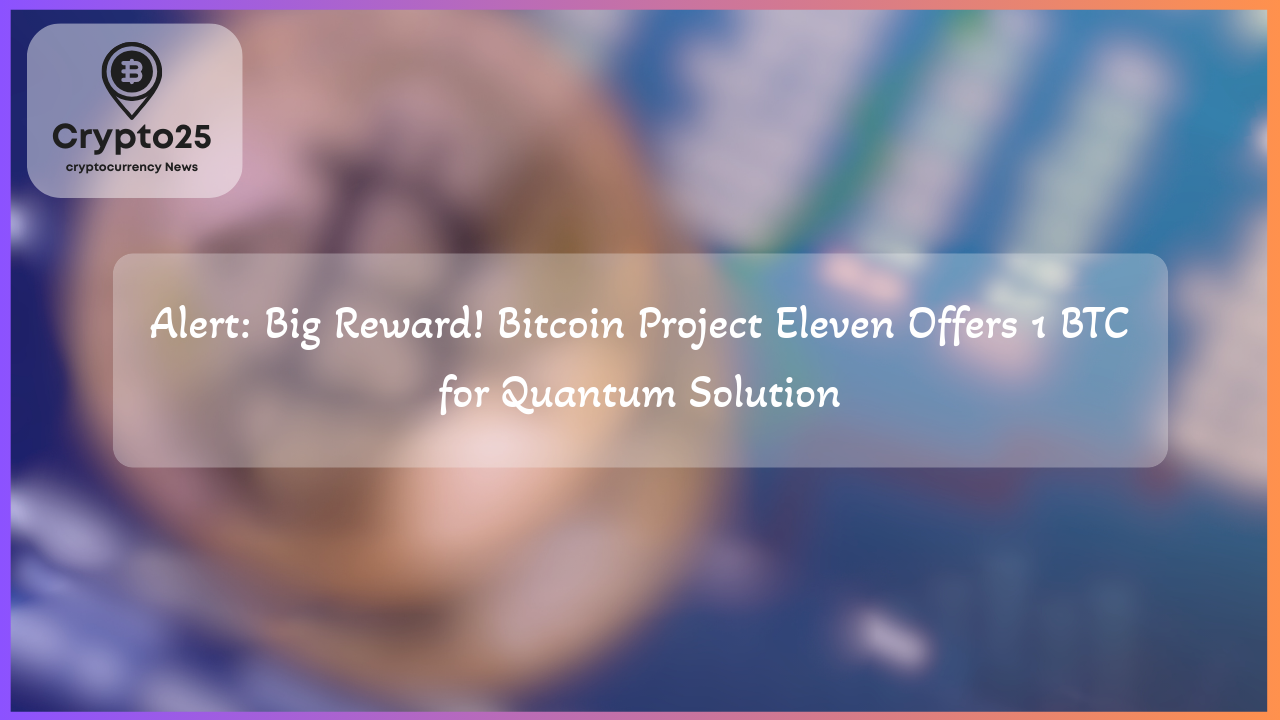
The fast-evolving domain of quantum computing is now setting its sights on Bitcoin’s backbone with a groundbreaking challenge. Project Eleven, a prominent quantum research organization, has unveiled the Q-Day Prize—a global competition offering 1 Bitcoin (BTC) to the first team that successfully cracks an elliptic curve cryptographic (ECC) key using Shor’s algorithm. The race is on to achieve this milestone by September 25, 2025, setting the stage for a collision of cutting-edge technology and the future of blockchain security.
## The Q-Day Prize: Targeting Bitcoin’s Security Through ECC Vulnerabilities
The Q-Day Prize is not simply another hypothetical exercise in cryptographic theory—it’s a call to arms for the scientific community. Specifically targeting the Elliptic Curve Digital Signature Algorithm (ECDSA), which ensures Bitcoin’s immutability and transactional security, this challenge seeks to transform long-held concerns about quantum cryptography into demonstrable proof of concept. By cracking an ECC key, participants would highlight the vulnerabilities within Bitcoin wallets, potentially changing the security landscape for over 6.2 million BTC, valued at nearly $500 billion, currently stored in exposed addresses.
The threat posed by quantum computing to traditional cryptographic measures has been a subject of serious debate for years. Alex Pruden, co-founder and CEO of Project Eleven, emphasized their mission to shift discussions from theoretical risks to tangible scenarios. By incentivizing teams across the globe to engage with this challenge, Project Eleven hopes to bridge the gap between quantum computing advancements and real-world blockchain implications.
## Rapid Advances in Quantum Computing and Their Implications for Bitcoin
Recent advancements in quantum computing technology underscore the urgency behind initiatives like the Q-Day Prize. Breakthroughs such as Google’s ‘Willow’ quantum chip, which completed a mathematical computation in just five minutes—something that would take traditional supercomputers 10 septillion years—exemplify the pace of innovation in this domain. Similarly, companies like Amazon and Microsoft have joined the race with their own innovations, respectively launching the ‘Ocelot’ and ‘Majorana 1’ chips. These innovations focus on improving error correction and optimizing algorithms such as Shor’s, the mathematical cornerstone of this challenge.
Meanwhile, startups like PsiQuantum have attracted massive funding, including $750 million in early 2025, to enhance photonic quantum chip designs specifically optimized for cryptographic challenges. Access to quantum computing has also expanded significantly, with leading providers, including IBM, AWS, Google Cloud, and Alibaba, now offering cloud-based quantum services to researchers and developers. This democratization of access has made revolutionary technology available globally, further fostering innovation in quantum cryptography.
The potential consequences of a successful breakthrough are staggering. Many crypto wallets expose their public keys after making an initial transaction. If Shor’s algorithm cracks ECC, such wallets could become susceptible to theft. Mass adoption of quantum-resistant cryptographic protocols may soon become not only advisable but necessary to preserve user funds and data privacy.
## Cryptographic Challenges and the Future of Blockchain Resilience
The Q-Day Prize builds on a long-standing tradition of cryptographic challenges designed to test and enhance the resilience of encryption technologies. Historical benchmarks like the RSA Factoring Challenge, launched in 1991, and Hal Finney’s 1995 SSL cipher experiment played pivotal roles in assessing and strengthening public key encryption methods. By offering tangible rewards to pioneers in computational cryptography, these contests accelerated innovation while identifying vulnerabilities, acting as early warning systems for evolving technological threats.
Project Eleven’s challenge stands not only as a benchmark for quantum computing but also as a wake-up call for the crypto and blockchain industries. “The Q-Day Prize is an open invitation to the brightest minds in quantum computing,” said Alex Pruden. Encouraging researchers to push the practical limits of current technologies, the initiative aims to foster groundbreaking developments while securing the future of digital assets.
For those daring enough to reshape the intersection of quantum computing and blockchain, additional information on how to register is available at QDayPrize.org. Whether this challenge ends in triumph or remains unsolved, the Q-Day Prize will undoubtedly shape the narrative around cryptographic security and Bitcoin’s survivability in a quantum-enabled future.
| Title | Details |
|---|---|
| Market Cap | $1.2 Trillion |
| At-Risk BTC | Over 6.2 Million Coins |
| Challenge Deadline | September 25, 2025 |
| Reward | 1 BTC |
